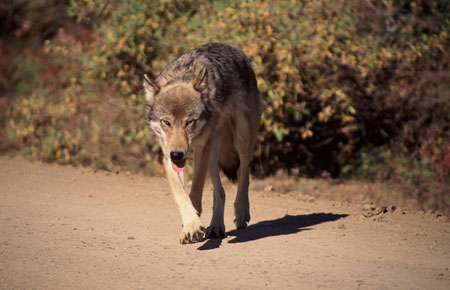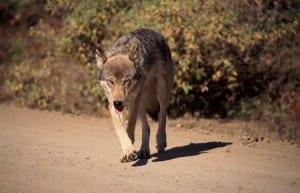A wolf harvest quota has been set for Game Management Unit 2, which is Prince of Wales Island and surrounding islands. According to a joint news release from the U.S. Forest Service and the Alaska Department of Fish and Game, biologists have set the state harvest at nine wolves.
Nine wolves is half of the maximum allowable harvest, based on a population estimate, announced in June, that showed the number of wolves on Prince of Wales Island and surrounding islands was 89. That’s a steep drop from the previous year’s estimate of 221.
That drop prompted calls to cancel all wolf hunting and trapping in the area. Six conservation groups sent requests to state and federal officials, asking them to help preserve the remaining animals.
David Person is a former Alaska Department of Fish and Game biologist, who now lives in Vermont. His work in Alaska focused on wolves, and he has helped conservation groups in their work to protect the Prince of Wales Island population.
Person said a legal harvest of nine wolves means an actual take of up to 15, when poaching is taken into account. He said there isn’t a hard and fast number that biologists can point to as a threshold for viability, but Person believes the wolf population for Game Management Unit 2 is too low, partly because of genetics.
“Because it is an island population, it’s mostly isolated,” he said. “So, when you eliminate entire packs, it’s like eliminating an entire salmon run in a stream. You potentially lose the entire genetic stock. So, if you reduce that population, keep bottlenecking it down to very low levels, you end up with very few breeders left and you end up with potential genetic inbreeding and genetic depression.”
Alaska Department of Fish and Game Southeast Region Supervisor Ryan Scott has said that while state biologists agree that the wolf decline in GMU2 is something to keep an eye on, the department isn’t concerned yet about the viability of that population.
But Person said there are examples in other parts of the world where wolf populations dropped, and were not able to rebound. He said state and federal officials have no idea what the viable population is for POW wolves.
“The reality of that, then, is you should be very conservative,” he said. “And a population – I think their latest estimate for the fall last year was 89 wolves, minus 29 reported killed, so that means 60, minus some that were probably not reported and killed, so the population could be 50 or below.”
Person believes many hunters and trappers would not have a problem with a closed season this year, if it helps keep wolves in the ecosystem over the long term.
“Unless you are someone who said, ‘Boy, I would just rather see wolves disappear from this ecosystem,’ well, if there are hunters and trappers that have that viewpoint, well, they’re just wrong. If there are hunters and trappers out who have a conservation bent, which I think is most of them, then they should want a viable population of wolves, as well as a harvestable population of wolves,” he said.
Larry Edwards runs the Sitka Greenpeace office, which is one of the groups that asked for a closed wolf season this year. He said he’s shocked that the department is allowing any harvest. Like Person, he pointed out that more wolves have been taken since last year’s estimate, so it’s unknown how many are left.
“One thing that we do know, from a conversation I had with one of the folks at Fish and Game, is that during their field season this spring, they found only one active den with one pup. That isn’t a good indication, either,” he said. “I think that we’re really in a crisis situation with the wolves on Prince of Wales and I’m totally shocked that Fish and Game would have an open season on them.”
Edwards adds that such a low harvest quota is difficult to manage, because hunters and trappers have two weeks to report their kill, and the quota could be surpassed before anyone knows it.
He said if the federal Office of Subsistence Management also allows a wolf hunt this season, that will add even more pressure to POW wolves.
The Federal Subsistence Board has scheduled a public hearing in Klawock on Prince of Wales Island, to get input regarding a subsistence wolf harvest.
“That will give them five days to make a decision, hopefully before their season starts on Sept. 1st, which is quite a while before the Fish and Game season starts in December,” he said.
Edwards said there are some steps conservation groups can take, such as requesting an emergency Endangered Species Act listing.
The Federal Subsistence Board public hearing starts at 6 p.m. Thursday at the POW Vocational and Technical Education Center in Klawock.
Below is the conservation groups’ request to close the wolf season this year.







